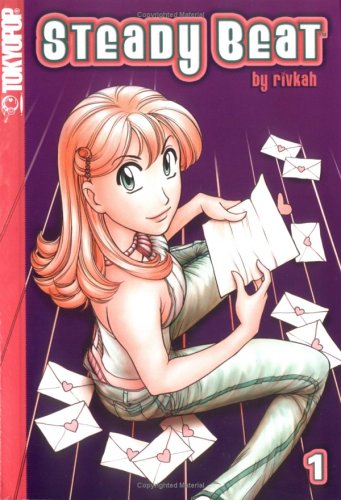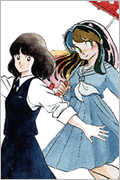 Rivkah questions my use of the term “OEL manga” in the piece I wrote for PWCW, saying “I didn’t realize anybody still called it that.” Admittedly, it’s a bit dated, and I usually use the term “global manga,” but in this case, I thought about the possibilities and decided that “original English manga” was exactly the term I needed. I was writing about Nightschool, a work that is marketed as manga and serialized in a manga magazine alongside Japanese and Korean comics, so calling it “global” seemed a bit rude—Japan and Korea are part of the “globe” as well. And “American manga” wouldn’t do, as I also mentioned a short story by the Australian creator Queenie Chan and Maximum Ride, by American writer James Patterson and Korean artist NaRae Lee. So the simplest term to link these works, and set them off from the Korean and Asian titles, was “OEL manga.”
Rivkah questions my use of the term “OEL manga” in the piece I wrote for PWCW, saying “I didn’t realize anybody still called it that.” Admittedly, it’s a bit dated, and I usually use the term “global manga,” but in this case, I thought about the possibilities and decided that “original English manga” was exactly the term I needed. I was writing about Nightschool, a work that is marketed as manga and serialized in a manga magazine alongside Japanese and Korean comics, so calling it “global” seemed a bit rude—Japan and Korea are part of the “globe” as well. And “American manga” wouldn’t do, as I also mentioned a short story by the Australian creator Queenie Chan and Maximum Ride, by American writer James Patterson and Korean artist NaRae Lee. So the simplest term to link these works, and set them off from the Korean and Asian titles, was “OEL manga.”
As to Rivkah’s belief that we should just call everything “comics” or “graphic novels,” sorry, that doesn’t seem very useful. When you say “manga,” people know what they are getting: a set format (black and white, about 200 pages, one of two standard trim sizes), a set of artistic conventions (some or most of which may be ignored by individual artists), a set of genres (again, not set in stone), and a storytelling style. It’s almost impossible to define manga, aside from format, because artists do experiment quite a bit—the characters in Nightschool don’t have big eyes—but, like porn, I know it when I see it. Kramer’s Ergot, Archie, Watchmen, Green Lantern, anything by Jason: not manga. Nightschool, Oishinbo, Monster, Fruits Basket: manga. And while you could indeed say that Kramer’s Ergot, Archie, and Green Lantern are all “just comics,” they in fact fall into different categories that are described by broad, generic terms—indy comics, kids’ comics, superheroes. These terms, like “manga,” exist because they are useful. Besides, if we just called them all “comics,” I would have to find a new title for my blog. (Image is of Steady Beat, Rivkah’s first, um, graphic novel.)
 Rumiko Takahashi’s new manga, One Sweet Sunday, is available online, in Japanese. This link at ANN explains how to navigate the page.
Rumiko Takahashi’s new manga, One Sweet Sunday, is available online, in Japanese. This link at ANN explains how to navigate the page.
Adrian Tomine discusses Yoshihiro Tatsumi’s A Drifting Life at Blog@Newsarama.
At Sporadic Sequential, John Jakala notes some similarities between Slam Dunk‘s Hanamichi and a certain big, quick-tempered American guy.
In case you’re coming late to the party, School Library Journal has a Dragonball 101 article for you.
News from Japan: The Manga Taisho awards are out, and Anime Vice has the list. The top manga was Chihayafuru, by Yuki Suetsugu, who was in the news a few years ago for her alleged plagiarism in Eden no Hana (Flower of Eden). ANN has the Japanese comics rankings for the past week.
 Reviews: Eva Volin reviews the first of the Udon kids’ comics, Swans in Space, at Good Comics for Kids. At The Hooded Utilitarian, Bill Randall discusses the “perfect girlfriend” character in manga and its weird expression in Minami’s Sweetheart.
Reviews: Eva Volin reviews the first of the Udon kids’ comics, Swans in Space, at Good Comics for Kids. At The Hooded Utilitarian, Bill Randall discusses the “perfect girlfriend” character in manga and its weird expression in Minami’s Sweetheart.
Julie on vol. 10 of Beauty Pop (Manga Maniac Cafe)
A Library Girl on vol. 1 of Chobits (A Library Girl’s Familiar Diversions)
Jillian Steinhauer on Good-Bye (The Daily Cross Hatch)
Connie on vol. 8 of High School Debut (Slightly Biased Manga)
Lissa Pattillo on vol. 1 of Legend of Zelda: Ocarina of Time (Kuriousity)
Kiara on vol. 1 of Papillon (Manga Jouhou)
Tangognat on vol. 1 of Pumpkin Scissors (Tangognat)
Michael C. Lorah on Solanin (Blog@Newsarama)
Katherine Farmar on Truly Kindly (Comics Village)
Katherine on V-Hunter (Okazu)
Brigid, I think that is the best argument on the whole manga/comics/oel/global/whatever subject I’ve ever read. Yes, these labels exist because they are useful. That is exactly it. Thank you.
You know, I agree with both of you. These words really do make for useful labels, in that a phrase like “manga” or “BD” immediately conjures up certain general similarities in stortyelling style, format, even serialization methods. But the idealist in me can’t help but hope for the day when we can just refer to everything as “comics” without having to worry about such considerations (or any negative associations that might come with such labels).
Dave, I think something that confuses me is… why should any of the labels be negative? I, for one, appreciate things being labeled, because I know what I like and what I don’t, and it helps me identify the things I might be most interested in buying out of the great sea of work that could be called “comics.” Sure, I branch out from time to time to try other things, but I’m most likely to do that on the recommendation of people I already know look for the same things I do in a story. If everyone stopped using these labels, it wouldn’t seem like an ideal world to me… just one in which I had to work a lot harder to find books that fit my taste. In the end, I’d probably just be frustrated and end up buying a lot fewer books.
Hi Brigid! :) I just wanted to clarify that I was only talking about American made comics. There’s no reason for anybody to stop calling Japanese comics, manga. You’ll notice further on, that I refer to French comics not as comics but as bande dessinee. I try to use the term from the culture that’s generally appropriate.
I don’t think any of the labels should have negative connotations but that doesn’t stop them from picking them up anyway. I think we’ve all had enough conversations with people who think all “manga” is about big-eyed schoolgirls fighting giant robot ninjas to think. “OEL manga” has a stigma in some circles as being poorly drawn second-rate crud, even though that hasn’t been true for years (if it was ever true to begin with). Really, what we need is for the labels we have now to be replaced with a better set of labels. For me “science fiction” or “romantic comedy” is always a lot more helpful than just plain “manga.”
The blanket term is “manga.” That’s really it as that’s the only term that matters to stores. Is it shelved with the manga, yes or no.
For the internet, though, Anime News Network uses the term “World Manga” and I still see blogs and other places using “oel manga.” I only ever see “Global Manga” really used here and on Tokyopop as it was their marketing term (and the only term that they could come up with that still had a domain name available).
In my own day-to-day work, I’ve found that I tend to just use the term “original manga,” though. (I.E. an original manga by Seven Seas, or a Seven Seas original, or something along those lines.)
You know it’s simple really. If you don’t like the term OEL, and don’t like it being applied to your work, then don’t give it to a manga publisher. If you want to be considered as a comic book artist, and have your work considered as such, give it to a comic book publisher.
For me, i’ll always use OEL, because thats what they are, Originaly English Language Manga.
OEL is passe? I guess I didn’t get the memo. I use OEL because I have a hard time using a Japanese term describe something born and published outside of Japan.
OEL is insufficient.
This is not OEL:
http://www.tokyopop.com/product/1594/YonenBuzz/1
Because it was nor originally in English, but in German.
If you use OEL, you’d have to use OGL parallelly, and how confusing would that be? I don’t like any of those labels, but I’d rather use “Global Manga” than pretend that only English-speaking people create manga-inspired comics. I really don’t need this Anglocentrism.